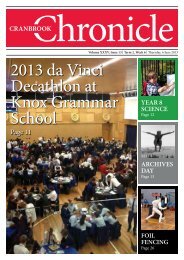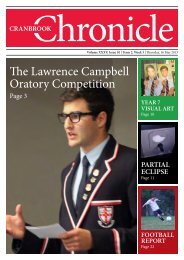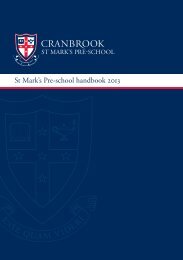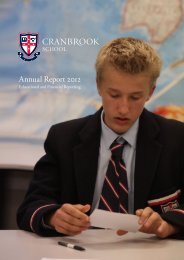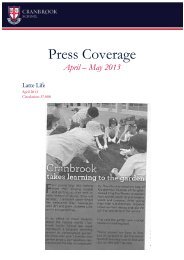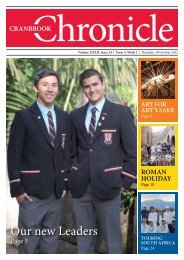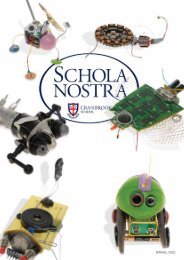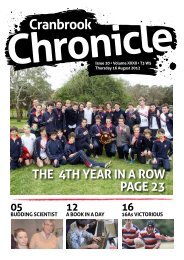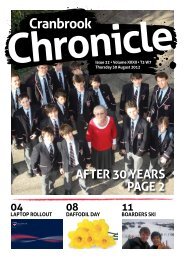View Here - Cranbrook School
View Here - Cranbrook School
View Here - Cranbrook School
Create successful ePaper yourself
Turn your PDF publications into a flip-book with our unique Google optimized e-Paper software.
The <strong>Cranbrook</strong> Chronicle<br />
From Studies<br />
Term 2 Assessments<br />
– Years 7 to 10<br />
The Years 7 to 10 assessment periods start<br />
next week.<br />
Dates for tasks are on the Year group<br />
calendar, and specific advice about each task<br />
is located on the subject page.<br />
Don’t forget about the study tips advice on<br />
the Portal too:<br />
<strong>Cranbrook</strong> <strong>School</strong> subscribes to the ELES<br />
Study Skills Handbook. This online resource<br />
contains information and interactive<br />
activities. Access to the Handbook is<br />
available at<br />
http://www.studyskillshandbook.com.au<br />
User name and password on the Portal<br />
(Year group home page)<br />
Absence from assessment tasks:<br />
Departments arrange catch-up testing<br />
for boys absent – a reminder that boys<br />
must bring a diary note from his parent<br />
or guardian if in Yrs 7 – 8 explaining his<br />
legitimate absence (illness or misadventure);<br />
a doctor’s certificate is required for Yrs 9<br />
and 10 students. Rules governing lateness<br />
and absence due to illness are in the relevant<br />
year Curriculum Outlines, provided in hard<br />
copy earlier in the year, on the portal, and<br />
referred to in the student diary (p 104) or<br />
portal/curriculum and assessment<br />
Term 2 semester reports<br />
Years 7 to 10 receive full reports at the end of<br />
term – attitude and achievement outcomes,<br />
performance grades and quartiles, teacher<br />
academic and pastoral comment, cocurricular<br />
information. Years 11 and<br />
12, and Year 10/11 accelerants, receive<br />
progress reports - attitude and achievement<br />
outcomes, task ranks for those tasks held<br />
this term.<br />
HSC Trial Examination<br />
Timetable<br />
The Trials are held in Weeks 1 and 2 of next<br />
term, starting day 1. The timetable and rules<br />
governing assessments and examinations<br />
will be available on the portal next week.<br />
Boys must familiarise themselves with the<br />
rules covering examinations and assessment<br />
– the rules on the portal and those in the<br />
HSC Assessment Guide.<br />
Once published, any Year 12 student or Year<br />
11 accelerant who has a problem with the<br />
timetable in terms of clashes, must see Mr<br />
Givney as a matter of urgency.<br />
Ronno’s RAve<br />
Esse quam videri<br />
Mr Ronaldson, Head of English<br />
(Special Programs)<br />
The Headmaster and staff are in the process<br />
of rethinking the <strong>School</strong>’s mission statement<br />
and in doing so have been discussing the<br />
significance of our motto. Courtesy of the<br />
magic of Wikipedia, I offer the following<br />
facts and then add some observations of my<br />
own.<br />
At one of the Headmaster’s recent staff<br />
breakfasts, called to facilitate the abovementioned<br />
discussion, I asked did anyone<br />
know where our motto originated. None of<br />
those present did, so a modicum of ‘research’<br />
– the Internet makes research so easy that<br />
one hesitates to use the word – reveals the<br />
following: the phrase is found in Cicero and<br />
also in Sallust.<br />
‘Esse quam videri is found in Cicero’s essay<br />
“On Friendship” (“De amicitia”, chapter 98).<br />
“Virtute enim ipsa non tam multi praediti<br />
esse quam videri volunt” (Few are those who<br />
wish to be endowed with virtue rather than<br />
to seem so).<br />
‘Just a few years after Cicero, Sallust used<br />
the phrase in his “Bellum Catilinae” (54.6),<br />
writing that Cato the Younger “esse quam<br />
videri bonus malebat” (He preferred to be<br />
good rather than to seem so).<br />
‘ Previous to both Romans, Aeschylus used<br />
a similar phrase in “Seven Against Thebes” at<br />
line 592, at which the scout (angelos) says of<br />
the seer/priest Amphiaraos: “ou gar dokein<br />
aristos, all’ einai theile” (his resolve is not<br />
to seem the best but in fact to be the best).<br />
Plato quoted this line in “Republic” (361b).<br />
‘In “The Prince”, Niccolò Machiavelli<br />
reverses this phrase to videri quam esse (to<br />
seem rather than to be) with respect to how<br />
a ruler ought to act.’ Wikipedia, ‘esse quam<br />
videri’<br />
Wikipedia lists something like 95<br />
institutions and schools that have the motto<br />
as their own, including Darwin High <strong>School</strong>,<br />
Dubbo High <strong>School</strong> and Hermitage House<br />
at Geelong Grammar <strong>School</strong>. It is also the<br />
motto of North Carolina.<br />
We all know the obvious meaning: ‘it is<br />
better to be than seem to be’, and again,<br />
the moral seems obvious: ‘it is better to be<br />
honest/to have integrity than to be deceitful/<br />
to be a hypocrite’. Yet these interpretations<br />
point to a question inherent in the motto:<br />
‘to be… what exactly?’ We assume it means<br />
‘to be honest’ or ‘to have integrity’ but these<br />
are assumptions. Cicero makes it clear that<br />
very few actually wish to be ‘endowed with<br />
virtue’; Sallust attaches the word ‘bonus’ –<br />
‘good’.<br />
In Shakespeare’s ‘Hamlet’, Polonius makes<br />
the famous observation to his son: ‘to<br />
thine own self be true’ – and yet Polonius<br />
is a long winded, sycophantic buffoon. He<br />
is murdered while spying on the Crown<br />
Prince.<br />
So the question remains ‘to be – what?’ If,<br />
like Polonius, you are true to yourself ‘then it<br />
follows, as night follows day, thou canst not<br />
be false to any man’. But what if that empty<br />
moral category, one’s self, ‘being’, is evil or<br />
corrupt? Adolf Hitler was true to himself,<br />
so was Joseph Stalin. Hitler appeared to be<br />
a peacemaker: Joseph Chamberlain came<br />
back from Munich waving a worthless<br />
piece of paper with Hitler’s signature on<br />
it, proclaiming ‘peace in our time’. It was<br />
not long before the true ‘being’ of Hitler<br />
replaced the ‘seeming’.<br />
So, while there is undoubted virtue in<br />
honesty, the quality and nature of what one<br />
is honest about is surely equally if not more<br />
important.<br />
Then there is also the question of ‘seeming’.<br />
Plato wished to banish poets and artists<br />
from his Republic because they were two<br />
removes from the truth: there was God’s<br />
ideal truth; then the copy of this truth in<br />
‘reality’; then the copy of this ‘reality’ in the<br />
work of the artist or poet. In other words he<br />
banned ‘seeming’.<br />
Wikipedia quotes Machiavelli as advocating<br />
seeming over being in his advice to Princes<br />
– deceptiveness is necessary in public<br />
policy. We see this every day in our modern<br />
politics; how often do politicians prevaricate,<br />
obfuscate, in short, lie?<br />
Good manners rely on ‘seeming’. I may<br />
suppress my true feelings or opinions in<br />
order not to hurt someone else’s. I may seem<br />
to be agreeable in order to survive and thrive<br />
in a particular social context.<br />
Plato’s idealism portrays our so-called reality<br />
as a form of seeming – to quote the King<br />
James Bible: ‘we see through a glass, darkly’.<br />
Many religions and philosophies see reality<br />
as a kind of dream or shadow, an illusion:<br />
a ‘seeming’. Existentialism sees ‘being’ as a<br />
void, nothingness. Civilisation is based on a<br />
striving to seem, teetering on the edge of the<br />
abyss of being.<br />
And Plato was right, surely: ‘seeming’ is<br />
of the essence in art. While the actor may<br />
strive for ‘truth’ in his or her performance,<br />
he or she is still acting, putting on a show,<br />
‘seeming’.<br />
So while I admire and respect our <strong>School</strong>’s<br />
motto, I repeat – what is it that we want to<br />
‘be’? And isn’t there are at least some merit<br />
in the practice of ‘seeming’?<br />
4



